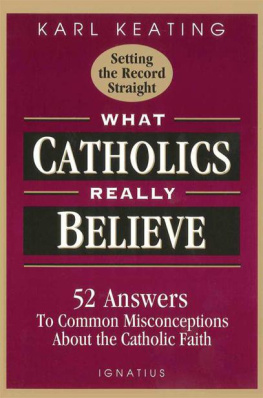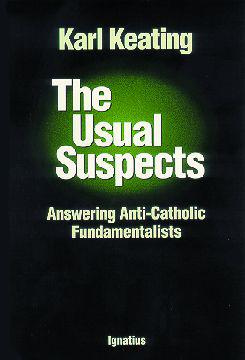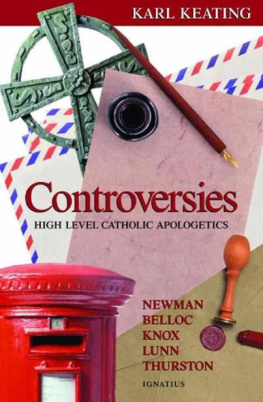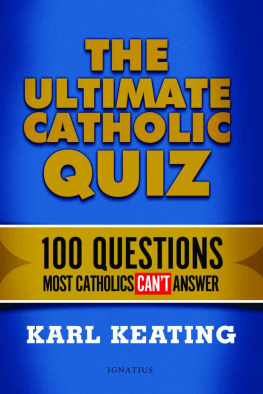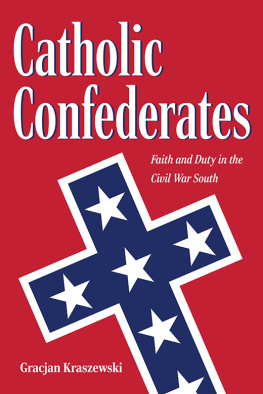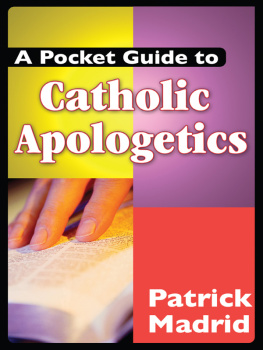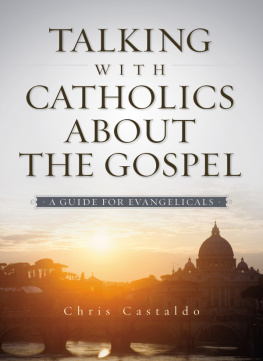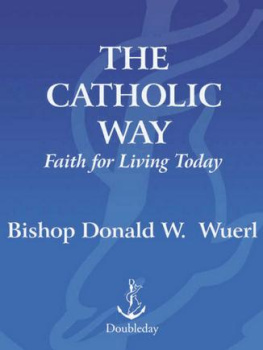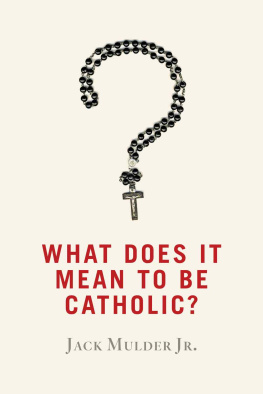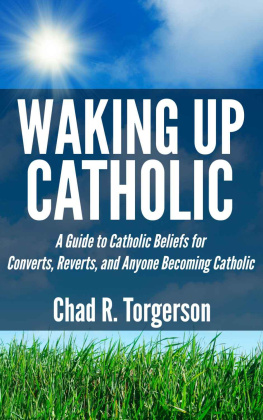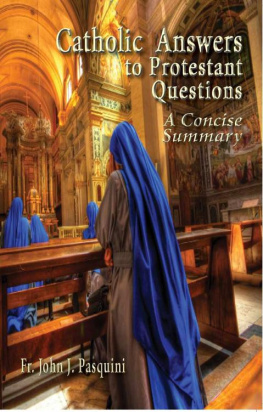WHAT CATHOLICS REALLY BELIEVESETTING THE RECORD STRAIGHT
What Catholics Really BelieveSetting the Record Straight
52 Answers to Common Misconceptions about the Catholic Faith
by
Karl Keating
IGNATIUS PRESS SAN FRANCISCO
Originally published by
Servant Publications
Ann Arbor, Michigan
Cover by Riz Boncan Marsella
1992 Karl Keating
All rights reserved
Reprinted in 1995
Ignatius Press, Francisco
ISBN 978-0-89870-553-9
Library of Congress catalogue number 95-75663
Printed in the United States of America
Contents
Introduction
Quiz time. Which of these ten statements are true?
1. Vatican II changed the Church from a monarchy to a democracy.
2. Youll definitely go to heaven if you attend Mass and confess your sins.
3. We now know the Bible contains mistakes.
4. When you get divorced, youre excommunicated and cant receive Communion.
5. Your conscience tells you whats right or wrong.
6. Every Catholic must go to confession at least once a year.
7. An annulment is a divorce for Catholics.
8. You sin if you dont believe in Church-approved apparitions of Mary.
9. Purgatory is no longer a required doctrine.
10. Good works help us earn salvation.
Have you written down your answers? Goodnow tear your answer sheet into little bits and throw them away. No matter which of these statements you identified as true, youre wrong. The list doesnt contain even one true statement. All ten are false.
Please forgive the deception. It isnt my intention to embarrass you. (I hope you took this quiz in private, not in front of an audience.) I just want to bring home that even good Catholics can have a less-than-perfect knowledge of their faith.
This little book contains fifty-two misconceptions many Catholics holdone misconception for each week of the year. The topics, prompted by thousands of questions Ive fielded from Catholic audiences over the last four years, range from extraterrestrials to relics, from astrology to reincarnation, from transubstantiation to ecumenism. I discuss the Church and its government, the Bible and its reliability, sacramental practices, Marian doctrines, the hereafter, evangelization, Catholic customs and devotions, and the spirit world.
These fifty-two topics are representative of Catholic confusions, but the list is hardly exhaustive. I was disinclined to write a multi-volume encyclopedia of mistakes, misconceptions, and misunderstandings. My goal in these few pages is simply to entice you to learn more about your faith. After reading this book, you might begin with the books listed in the bibliography. The better you know your Catholic faith, the better you will live it, and the better you live it, the better you will serve Jesus Christ, who is the way and the truth and the life (Jn 14:6).
_________
ONE
_________
The
Teaching Church
and
Its Authority
The Teaching Church and Its Authority
The pope can change doctrine.
Dont tell him that, or youll get a lecture. Hell explain to you that popes are only guardians of doctrine. They have no power and no desire to change doctrine. Their task is to pass on, in its integrity, the whole corpus of Catholic teaching, and the Holy Spirit protects them in this.
What a pope can do, and what many popes have done, is change Church customs . Many of these changes have occurred within our own time. Older Catholics recall, for instance, when abstinence from meat was required on Fridays and when Mass was celebrated in Latin rather than in the vernacular. These were not doctrines, but customs. Therefore, they were changeable. As a rough rule of thumb, doctrine concerns what we believe, while customs concern how we do things. No pope will ever teach that the resurrection was only symbolic, that Jesus bones are still in the tomb. That would be a change of doctrine, and the Holy Spirit wouldnt stand for it. One hopes Catholics wouldnt either. But a pope theoretically might instruct priests to celebrate Mass no longer in vestments but in top hats and tails. We may hope the Holy Spirit would preserve us from such a foolish decision and visual disaster, but theres no guarantee.
Let me give a further example: We believe Jesus is really presentbody, blood, soul, and divinityin the Eucharist, but Mass may be celebrated in any approved language and in any approved form. If the language of the Mass never could change, we wouldnt even have Latin Masses. After all, Jesus didnt speak Latin, so far as we know, but Aramaic, the common language of Palestine. This was the language Jesus no doubt used at the Last Supper. If the language of the Mass were a matter of doctrine rather than custom, the language couldnt be changed.
Infallibility means that everything the pope says is true.
Dont bet on it. If the pope tells you which team will win the next World Series, keep your money in your pocket. He has no more insight into the outcome of sporting events than you or I do. And if he gives you a list of the best novels of all time, thank him profusely, but feel free to develop your own literary Top Forty.
The pope is infallible, but he isnt a know-it-all. His charism of infallibility, which he enjoys as the successor to Peter, is strictly limited. Vatican I (1869-1870) taught and Vatican II (1962-1965) reaffirmed that the pope teaches infallibly when he proclaims by a definitive act some doctrine of faith or morals. So states Vatican IIs Dogmatic Constitution on the Church . Note the limitation: Papal infallibility extends only to matters of faith or moralsnot to Church customs, not to sports, not to literature, not to most things of everyday life. And infallibility comes into play only when the pope proclaims by a definitive act. This means a formal, public statement. An offhand comment over lunch doesnt count.
By the way, infallibility isnt limited to the pope or to papal decrees. The bishops, when united with the pope in an ecumenical council, also teach infallibly on matters of faith or morals. There have been twenty-one ecumenical councils, and most of them have issued doctrinal or moral decrees. Those decrees are infallible. Many councils have issued disciplinary decrees also, but those decrees are not infallible because they do not concern directly matters of faith or morals.
There is a third mode of infallibility. The pope and the bishops dont have to meet in a council to teach without error. The Holy Spirit guarantees they will teach truly whenever they reiterate what the Church always has taught. The Church always has taught the historical reality of the resurrection, for example, and an individual bishop teaches infallibly when he reiterates this teaching.
Vatican II teaches that the Church should be like a democracy. Thats why we have parish councils.
If the Council taught that, even the sharpest-eyed readers have failed to find the passage. The Church never has been a democracy and never will be one. Its structure is patterned after the structure of heaven, which is an absolute monarchy with God on the throne. He is the ruler, and we are his subjects. He appointed a prime minister, Peter, to rule in his absence, investing him with much of his own authority as king and shepherd (Mt 16:18-19, Jn 21:15-19). He gave Peter chief assistants, the other apostles. This pattern of government continues today through apostolic succession in the pope and the bishops in union with him.
So why do we have parish pastoral councils? Not because the Church has been changed from a monarchy to a democracy. Remember terms like these properly should be reserved for political institutions only. With respect to the Church theyre not quite accurate and should be used only in an accommodated sense. No, pastoral councils have several practical purposes: to relieve parish priests of administrative burdens which can be accomplished as well, often better, by parishioners; to give the pastor feedback from the pews; and to develop a pastoral plan for the parish. In all these the council is a consultative, not a legislative, body. It makes recommendations to the pastor, but doesnt usurp his authority or duties. The pastor cannot abdicate his authority, which comes from the bishop, to a parish council, but he may delegate as much of it as necessary. Of course, he cant delegate his purely sacramental functions, for which ordination is required.
Next page
